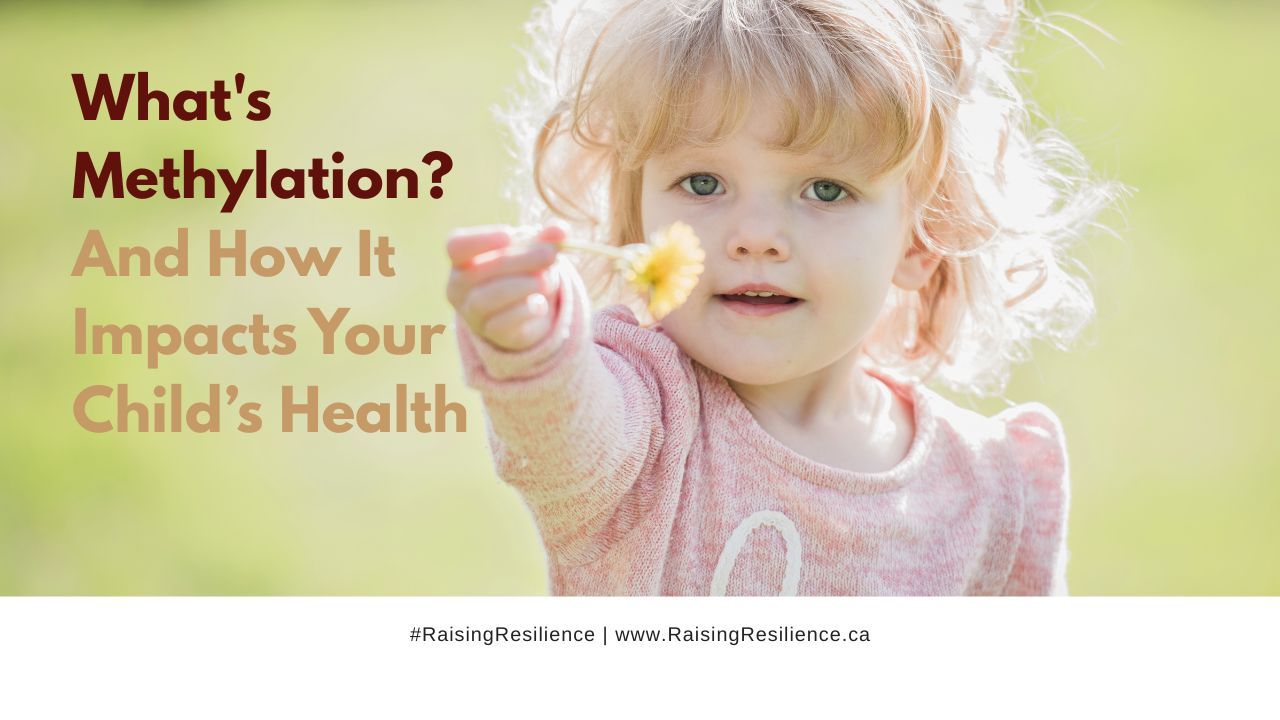What's Methylation? (And How It Affects Your Child’s Mood, Health & Development)

If your child struggles with mystery symptoms that you can't get a handle on - anything from mood swings, poor sleep, low energy, allergies, skin problems, or trouble focusing - there’s a hidden process in the body that could be part of the picture: methylation.
Parents often hear about methylation in conversations about genetics or nutrition, but it can be confusing. So here’s a simple guide to what methylation is, why it matters for kids, and how you can support it at home.
Methylation: The Body’s Tiny “Switch” System
Methylation all starts with something called a methyl group - that is simply a package made of one carbon atom and three hydrogen atoms that our bodies know how to make.
Methylation is a chemical process that happens when a methyl group gets attached to another molecule.
Thousands of these methyl group packages are donated (attached) to molecules every second all over the body. And this simple donation action works like a switch: it can turn genes on or off, help enzymes work, make brain chemicals, support detoxification, and so much more.
Methylation happens millions of times every second in every cell. When it’s running well, it supports:
-
Healthy brain function and mood balance (by influencing neurochemicals)
-
Sleep (by converting serotonin to melatonin)
-
Reducing Allergy symptoms (by breaking down histamine)
-
Detoxification (methylation helps remove toxins and metals)
-
Repair (methylation helps repair DNA after stress or toxin exposure)
-
Cellular resilience (methylation keeps cell membranes strong and healthy)
When methylation is not working well, these processes can slow down. And that's when symptoms may appear.
Signs Your Child May Have Methylation Imbalance
Recent research shows methylation is critical for brain development, immune function, and stress regulation in kids (Lardenoije et al., 2019; Smith et al., 2020).
Imbalances can look different from child to child, but common signs include:
-
Trouble falling asleep or staying asleep
-
Mood swings, anxiety, depression, tendency to panic, or general irritability
-
ADHD-like behavior, figity
-
Energy crashes or constant fatigue
-
Allergies, congestion, headaches
-
Difficulty concentrating or remembering things
-
Frequent digestive upset or food sensitivities
-
Obsessive
Methylation isn't always the cause of these symptoms and often they don't ALL apply, but when several are present or if you just can't get a handle on what's going on in other ways, it’s worth looking into.
What Affects Methylation in Kids
Methylation is partly influenced by genetics, but lifestyle has a big impact as well. Studies in epigenetics show that diet, exercise, stress, and environment can shift methylation patterns, sometimes in as little as just weeks (Kim et al., 2020).
If your child has mysterious symtpoms that you now see may correlate with methylation imbalance, there are lots of ways you can support their methylation system.
The following support healthy methylation:
-
Good nutrition - folate, vitamin B12, B6, zinc, magnesium, and protein are crucial for good methylation.
-
Regular physical activity - exercise helps the body create more methyl groups and regulate the methylation system.
-
Calm, safe emotional environment - this may sound "fluffly", but stress eats up methyl groups, so the calmer we can keep your child's nervous system, the stronger their methylation system will be.
-
Healthy gut microbiome - this is a crucial aspect in two ways: it's how we optimize nutrient absorption so the methylation system can work, and it's a big potential source of stress.
- Toxin-free lifestyle - chemicals require methylation to be flushed from the body. So the more chemicals we're exposed to, the more our system is taxed. Getting chemicals out is crucial.
Testing Methylation in Kids
You don’t always need lab tests before making gentle changes to support methylation, but some families choose testing to get a clearer picture.
Options include:
-
Blood tests for histamine and nutrient levels. Homocysteine can also be a clue in older kids.
-
Genetic testing for methylation-related gene variants (like MTHFR) and other variants relating to methyl-related nutrients (like PEMT or FUT2)
-
Organic acids urine tests to check nutrient metabolism, glutathione, and toxin accumulation
-
Questionnaires that identify methylation patterns
Remember: genetics show tendencies, but day-to-day methylation function depends heavily on lifestyle and nutrition.
The Takeaway for Parents
Methylation is one of your child’s most important body processes, affecting everything from mood to immune resilience. It's often at the root of mystey-symptoms you can't get a handle on.
The best first step is to add nourishment through balanced nutrition, quality sleep, physical activity, and emotional safety. From there you can get more targeted by supporting the process with specific nutrients if they are found to be low or poorly used.
Supporting methylation isn’t about fixing a “flaw”. It’s about giving your child’s body what it needs to run the way it was designed to. Knowing your child's methylation tendencies helps you parent them in a way that supports their mental and physical resilience.
Select References:
- Methylation and brain function
- Diet and Methylation
- Stress and methylation
-
The role of methylation and histamine in mental health and treatment response
Related Posts:
https://www.jesssherman.com/blog/decoding-teen-mood-swings-the-role-of-the-comt-enzyme
https://www.jesssherman.com/blog/is-adhd-a-methylation-problem
https://www.jesssherman.com/blog/why-is-my-child-so-angry-disruptive






